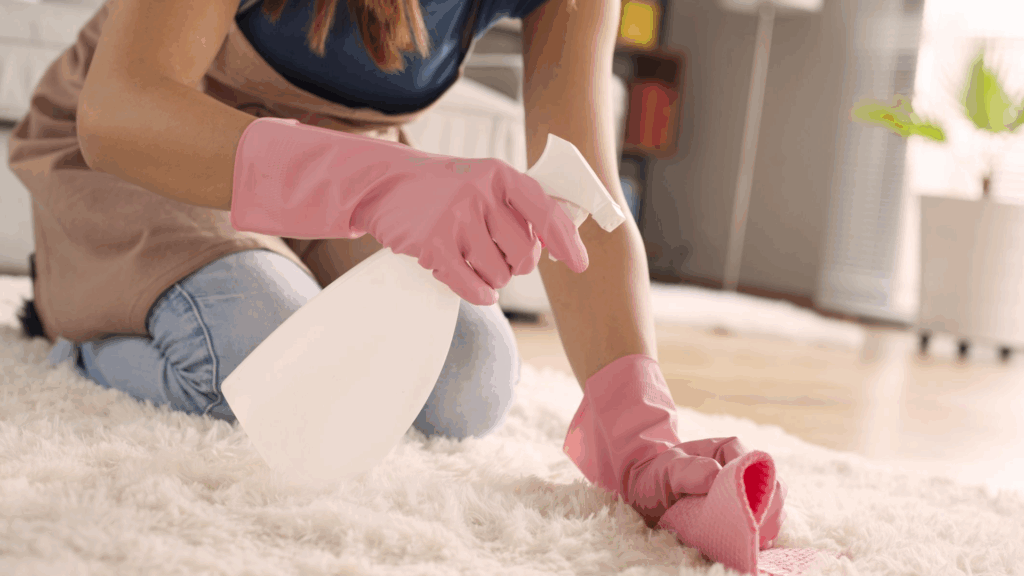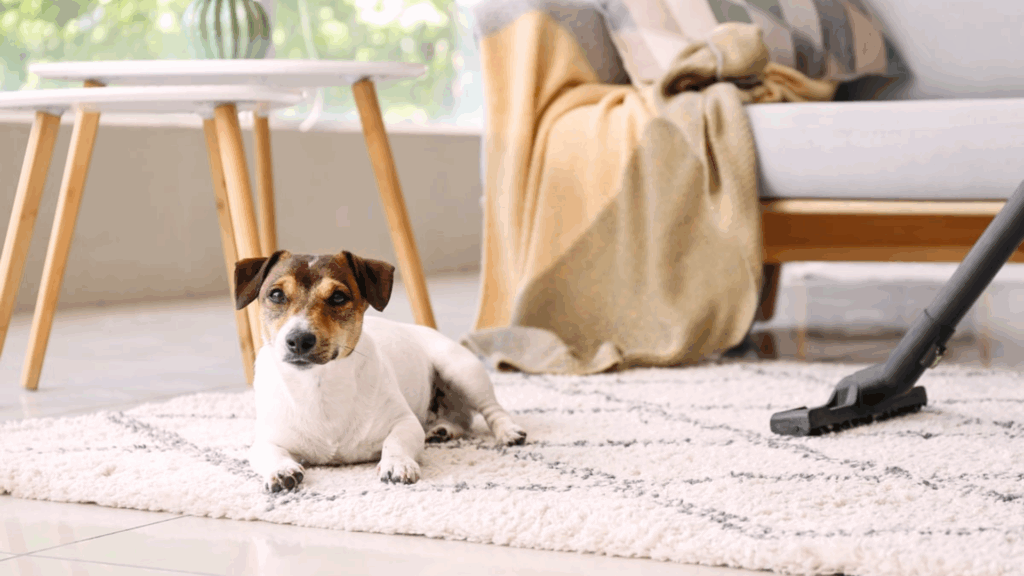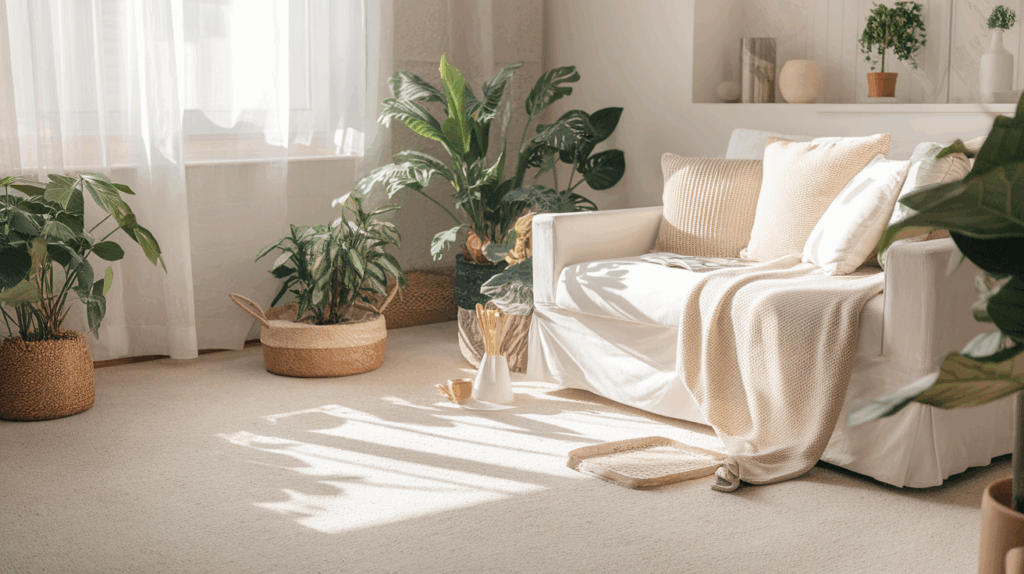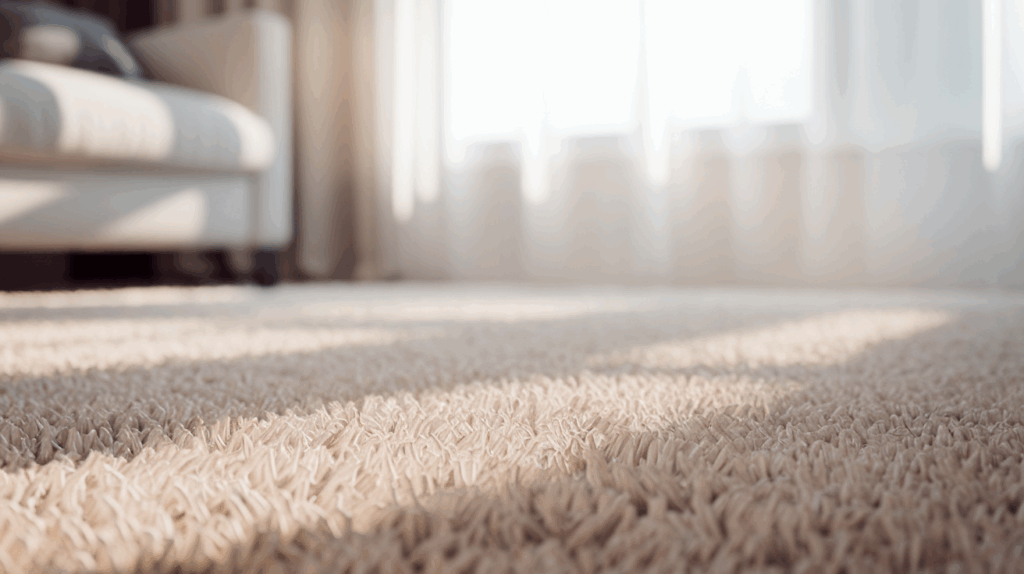Ever walked into your living room and caught a whiff of something not-so-fresh coming from your carpet?
You’re not alone. Carpets trap odors from daily life, such as pets running around, spilled drinks, outside shoes, and hidden moisture.
The good news? You don’t need expensive products or special equipment to fix smelly carpets. With a few simple, tested tips, you can make your carpets smell clean again.
In this blog, you’ll learn:
- Quick fixes for immediate odor relief
- Deep cleaning methods that really work
- Prevention tips to keep bad smells away
I’ll show you how to tackle carpet odors step by step, using items you likely already have at home.
These methods have worked for thousands of homeowners just like you, and they’ll work for your carpets too.
Let’s get your carpets smelling fresh again!
Why Does Your Carpet Smell Bad?
Your carpet works like a giant filter in your home. It traps everything that falls onto it – dirt particles, bacteria, food bits, moisture, and allergens.
Over time, these trapped materials can create unpleasant odors, even when your carpet looks clean on the surface.
Think about it: you walk on your carpet every day. Your shoes bring in outside dirt. Your pets leave behind fur and accidents.
Food and drinks spill. All of this sinks deep into the carpet fibers where you can’t see it.
And here’s what happens next:
- Moisture gets trapped underneath
- Bacteria grow in a warm, damp environment
- Mold and mildew might start forming
- Pet urine crystallizes and releases ammonia smells
The smell is usually your first warning sign. Your nose knows something’s wrong before your eyes can see it.
When you notice that musty or sour smell, it’s your carpet telling you it needs help. Even if you vacuum regularly, that alone won’t remove the deeper causes of odors.
The vacuum only picks up surface dirt, leaving behind the stuff that’s really causing the smell.
I’ve seen many homes with carpets that looked perfectly fine but smelled terrible when you got close. That’s because regular cleaning isn’t the same as odor removal.
Quick Fixes to Make Your Carpet Smell Fresh

1. Baking Soda Method
Baking soda is my go-to first step for carpet odors. It naturally absorbs smells instead of just covering them up.
Sprinkle a thin, even layer across your smelly carpet, and let it sit for at least 30 minutes. For stronger odors, leave it overnight. Then vacuum thoroughly.
Make sure your vacuum has a fresh bag or empty canister before you start.
You can add a few drops of your favorite scent to the baking soda before applying. Just mix it in a container first to distribute the scent evenly.
2. Vinegar and Water Spray
White vinegar cuts through many odors and helps kill bacteria. Mix equal parts white vinegar and water in a spray bottle.
Lightly mist your carpet, don’t soak it! The vinegar smell disappears as it dries, taking other odors with it.
Caution: test this on a hidden spot first to make sure it won’t damage your carpet. Some carpet materials or dyes may not react well to vinegar.
3. Essential Oils
Essential oils add pleasant scents while helping fight odors. I find that lavender, tea tree, and lemon oils work best for carpets.
You have two good options: first, mix 10-15 drops with a cup of baking soda, then apply as above, then add a few drops to a room diffuser to freshen the air around your carpet.
Remember that a little goes a long way with essential oils. Too much can be overwhelming and might attract dirt faster to your carpet.
4. Lemon Juice Mist
For mild smells, try a light spray of lemon juice and water. Mix one part lemon juice with two parts water in a spray bottle.
The natural acids in lemon help neutralize odors while leaving behind a clean scent.
This works well for small areas or for a quick refresh before the company arrives. The citrus scent is especially good at cutting through cooking odors that have settled into your carpet.
5. Carpet Powders or Store-Bought Fresheners
Commercial carpet fresheners can work in a pinch. Look for products that neutralize odors rather than just mask them.
Use these products sparingly; too much can leave a residue that actually attracts more dirt.
Check the ingredient list and avoid products with harsh chemicals if you have children, pets, or allergies.
Some of these products contain unnecessary additives that might cause problems for sensitive people or animals.
Common Causes of Carpet Odors

1. Pet Accidents
Even if you clean up pet accidents right away, urine can seep deep into carpet padding.
When dried, the urine leaves behind crystals that give off a strong ammonia smell each time they get wet again.
I recommend treating pet spots with special cleaners that break down these crystals instead of just masking the smell.
Your furry friends might also leave behind other messes that sink into carpet fibers.
Regular pets will occasionally have accidents, so don’t feel bad when it happens – just make sure to clean thoroughly!
2. Spills and Stains
Food and drink spills are carpet odor magnets. Milk, coffee, wine, and juice can all leave behind smells that get worse over time.
When liquid soaks into carpet padding, it creates a perfect spot for bacteria to grow.
You might think you’ve cleaned up that pasta sauce spill completely, but tiny food particles can remain deep in the carpet where you can’t see them.
As they break down, they release bad smells.
3. Humidity or Dampness
Water is your carpet’s worst enemy. High humidity or water damage can lead to mildew growth, which comes with that classic musty smell.
Have you noticed your carpet smells worse on rainy days?
That’s because moisture in the air reactivates old odors, damp conditions help bacteria multiply faster, and water may be getting into your carpet padding from below.
Basements and ground floor carpets are most at risk for this type of odor problem.
4. Lack of Ventilation
When air doesn’t move around enough in a room, smells get trapped in your carpet. Think about rooms you keep closed up – they’re often the ones that smell mustiest.
Your living spaces need good airflow to prevent odors from settling in. Without fresh air coming in, even normal everyday smells from cooking and living can build up in carpet fibers.
5. Heavy Foot Traffic
The oils and dirt from everyone’s shoes get ground into high-traffic carpet areas day after day. This buildup is a major source of carpet odors.
You might not notice how much grime comes in on shoes until you see the difference between carpet in a rarely-used guest room versus your main hallway.
Every step adds a tiny bit of dirt that eventually leads to a smell.
How Often Should You Deep Clean?
Keeping your carpet fresh requires regular care. While weekly vacuuming helps maintain your carpet’s look, deep cleaning is needed too. But how often should you do it?
1. Regular Vacuuming Schedule
Vacuum high-traffic areas 2-3 times per week. This keeps dirt from building up and grinding into your carpet fibers.
For less-used rooms, once a week is usually enough. Use slow, overlapping passes to pick up the most dirt.
I find that many people vacuum too quickly, which doesn’t allow the vacuum to pull up deep dirt.
Take your time and go over the same spot several times, especially in doorways and paths where people walk most often.
2. Spot Cleaning
Clean spills and spots as soon as they happen. Don’t let them sit and soak in! Blot (don’t rub) with a clean cloth, then treat with an appropriate cleaner.
Even water-only spills should be dried thoroughly to prevent odor-causing moisture from staying in your carpet.
The longer a spot sits, the harder it becomes to remove completely. This is especially true for pet accidents, which need special treatment with enzyme cleaners.
3. Steam Cleaning
Steam clean your carpets every 6-12 months for normal households. If you have kids, pets, or allergies, bump this up to every 3-6 months.
The hot water extraction method pulls dirt from deep in the carpet fibers.
You can rent steam cleaners at many grocery or hardware stores. Make sure to follow the directions carefully, too much water left behind can create new odor problems!
4. Professional Cleaning
Hire professionals every 12-18 months for a thorough deep clean. They have stronger equipment than rental machines and know how to treat different carpet types correctly.
For stubborn odors that won’t go away with your own efforts, professional cleaning might be your best solution.
Tell the carpet cleaner about specific problem areas so they can give those spots extra attention.
5. Special Situations
Some situations call for more frequent cleaning, such as after big parties or events, during allergy seasons, after pet accidents, in homes with smokers, and when someone in your home has been sick.
Trust your nose; if your carpet starts to smell bad between regular cleanings, it’s telling you something needs attention.
Pro Tips to Keep Carpets Smelling Good Longer

1. Open Windows Daily
Fresh air is one of the best carpet fresheners, and it’s completely free! I open my windows for at least 15 minutes each day, even in cold weather.
Good airflow carries away the stale smells that build up indoors.
Cross-ventilation works best – open windows on opposite sides of your home to create air movement.
This helps flush out odors that have settled into your carpet fibers. On nice days, leave windows open longer to give your carpets a real breath of fresh air.
2. Vacuum Slowly and Regularly
Most people vacuum too quickly to really clean their carpets. Slow down! Go over each section multiple times, moving in different directions.
This pulls up more dirt and helps the carpet fibers stand up straight.
Pay special attention to areas around furniture and along walls. These spots collect dust that regular vacuuming might miss.
Empty your vacuum canister or change the bag regularly – a full vacuum doesn’t clean as well and can actually spread odors.
3. Use Area Rugs or Runners
Protect your main carpet by using smaller rugs in high-traffic zones. These catch dirt before it gets ground into your permanent carpeting.
Plus, you can wash or replace these rugs more easily when they start to smell.
I place washable runners in hallways and by exterior doors. This simple step has cut down on how often I need to deep clean my wall-to-wall carpeting.
The best part? You can throw most area rugs in the washing machine when they get smelly.
4. Try a No-Shoes Policy Indoors
Your shoes track in dirt, bacteria, and all sorts of outdoor grime. Start a shoes-off rule at the door, and you’ll see a big difference in your carpet’s cleanliness and smell over time.
Keep a basket of slippers or clean socks by the door for family and guests.
You might be shocked at how much less often you need to clean when outdoor dirt stays outside. This one habit can add years to your carpet’s life!
5. Use Carpet-Safe Sprays or Fabric Refreshers
Between deep cleanings, light fabric refreshers can give your carpet a quick boost. Look for products specifically made for carpets, not just air fresheners that fall onto the carpet.
Use these products lightly – a fine mist is enough. Too much product can leave residue that attracts more dirt.
Test any new product on a hidden spot first to make sure it won’t stain or damage your specific carpet type.
Conclusion
You can have fresh-smelling carpets without spending a fortune. Small changes in your daily habits make a big difference in how your carpets smell.
The baking soda trick alone has saved many of my clients from replacing their carpets completely.
I suggest picking just one tip from this article to try today. Maybe start with a thorough, slow vacuum session or sprinkle some baking soda before bed tonight.
Small steps lead to big results when it comes to carpet care.
Remember, clean carpets do more than just smell nice. They make your entire home feel fresher and more welcoming.
They can even help family members who struggle with allergies or asthma.
With these simple methods, you’ll walk into your home and notice the difference—clean, fresh-smelling carpets that make your space feel as good as it looks!

